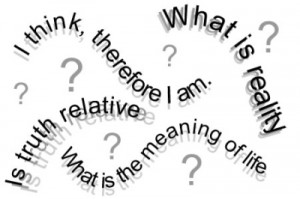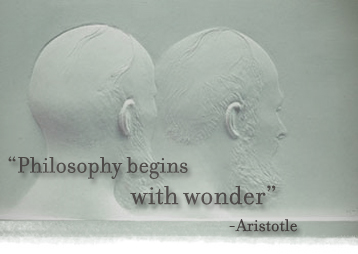One of mankind’s greatest intellectual triumphs is its discovery of a love of wisdom commonly known as Philosophy. Unfortunately, especially in the United States, any mention of the term solicits a roll of the eyes and an insult about an ivory tower or some scatterbrained professor with mismatched socks. All the pea brains laugh and that’s the end of the discussion – philosophy has no place in real life – it’s only for eggheads in dusty libraries. Hmm, I beg to differ.
It can be argued that we currently live in a Dystopia with our surfeit of digital distractions, inability to read deeply, environmental degradation and political stalemating. Even if evolution was frozen tomorrow – we’d still need a new and improved method for problem solving. The same ne’er-do-wells who denigrate philosophy often bow in deference when a priest steps from his pedophile penthouse and slithers down the street as if a halo atop his head. Sorry folks, religion cannot help us – faith is a synonym for ignorance in my book and as some will argue – itself the root of all evil. Not covet thy neighbor’s wife? Please… How about his mistress? Hold no false gods before thee? C’mon dear god, you’re awful insecure for an omnipotent one. Obviously folks, philosophy must be wrenched from the glistening tower and slung smack-dab on Main Street. Heck, Socrates, Kierkegaard and others tried to bring its wisdom to the street, why haven’t we listened?
Now I haven’t a surefire application for this idea but we’d need a council of some sort. Before you throw up your hands and say “Oh god, not another committee”, keep in mind this group will have no government affiliation, be privately funded and be regularly evaluated for quality. Its mission statement will be crystal clear and its members held to the highest standards. If the Supreme Court was a collection of philosophers representing the various schools (i.e., existentialism, utilitarianism, pan-en-theism, Kantianism, Platonism etc.) rather than a collection of lawyer clowns, our society might have hope. Perhaps our council members could be voted in by a sub-assembly who itself was voted in by other screened individuals. Here is as good a time as any to express my elitist philosophy of voting. I think people should have to pass a knowledge test in order to cast a ballot. Election to a philosophical council or sub council would be the most stringent of all. Such persons will be selected for high intelligence, philosophical knowledge, emotional intelligence and stability. I know what you’re thinking, “wake up pal, this is reality, not a utopian dreamland” and of course you’re right, but I’m simply offering an idea, an ideal for that matter. Stay with me for a moment. These high minded council members will then concoct recommendations for the cutting issues of the day. The arguments will be recorded and publicized, a la the Supreme Court, and a document will then be passed to the legislative and in some cases the judicial branch. This would at least give our decisions intellectual heft, breadth, substance, and justification. Something to hang our chapeaus on.
So Philosophy in, religion out; it’s an intellectual version of gentrification. We’ve had two thousand years of totalitarian Christianity and despite some successes, the failures are too profound to disregard. Life is becoming increasingly complex and our moral codicils must parallel. Religion can be wonderful for some but its irrational edifice disqualifies it (along with pseudo-science, fairy tales and voodoo) from our illustrious board of wise men. Real Science has a prominent place at the table as new discoveries will continually augment its worth. To paraphrase Sam Harris, “who says science has nothing to say about morality?” But since science is the study of nature and nature is not a system to be worshiped but, au contraire, often one to be overcome, it has little to say in a discussion of when, for example, is the age of consent? To such questions we can only turn to philosophy and to only a thoroughly vetted collection of philosophies for the best solution.
Let me give an example. We all know we have a strident red state blue state dichotomy in the U.S. Nothing gets done because of an irrational ideological clinging which veers further and further from what might be called truth. And what is the basis for this ideology? Whether people know it or not, it’s very simple. Reactionaries think “Man is bad”, progressives think “Man is good.” Behind every dispute, like gun control for example, lies a fundamental belief about the nature of man. Perhaps our Socratic council could take up this question (What is man)? Maybe evidence would show that good environments generally produce good people. What is a good environment? It wouldn’t surprise us if support, education, recreation and the meeting of physical needs were agreed upon. Policies promoting such environments should then please one and all. As evidence accumulates, maybe the question could be answered, at least with caveats. I don’t know, maybe not. I’m not insinuating this example is any kind of deep solution but the point is manifest; only through serious inquiry can we hope for practical resolutions.
 Back to the almighty edifice of science, its rep would sit at the head of our table, in a mahogany chair no less. As I mentioned above, science doesn’t have all the answers but its reach grows daily. Case in point, neurology is becoming increasingly proficient at locating areas within the brain that are responsible for certain functions (i.e. primitive and/or more evolved emphatic emotions). It’s possible that one day we will be able to argue persuasively about the evolution of morality and lay waste to the notion that it is somehow bestowed from without by some deity or supernatural force. We are also becoming increasingly confident that our universe was created through a quantum fluctuation – thereby abolishing first cause. Other positions on the panel will be awarded based on historical weight and practical application; hence the well-known approaches (Utilitarianism, existentialism etc.) will get a cherry wood seat but newcomers will also be considered. In fact, one member might represent “other” (overlooked thought systems current or past). The body would be dynamic and flexible to prevent the stodginess of organized religion. To reiterate my position, religion would be forbidden from the panel, that is, unless it shows it can learn from experience (not likely). We’d then only consider it if it sticks to grand concepts like compassion, love and concern for the poor. Buddhism would have no place due to its apparent lack of interest in everyday affairs, Hinduism would be forbidden because of its ridiculous fecundity, and neither Islam nor Judaism has anything to offer not trumped by Christianity. So in theory we might allow a broad based idealized religious representative at the table but in reality, probably not. The emphasis will be on reason, rationality and above all, wisdom.
Back to the almighty edifice of science, its rep would sit at the head of our table, in a mahogany chair no less. As I mentioned above, science doesn’t have all the answers but its reach grows daily. Case in point, neurology is becoming increasingly proficient at locating areas within the brain that are responsible for certain functions (i.e. primitive and/or more evolved emphatic emotions). It’s possible that one day we will be able to argue persuasively about the evolution of morality and lay waste to the notion that it is somehow bestowed from without by some deity or supernatural force. We are also becoming increasingly confident that our universe was created through a quantum fluctuation – thereby abolishing first cause. Other positions on the panel will be awarded based on historical weight and practical application; hence the well-known approaches (Utilitarianism, existentialism etc.) will get a cherry wood seat but newcomers will also be considered. In fact, one member might represent “other” (overlooked thought systems current or past). The body would be dynamic and flexible to prevent the stodginess of organized religion. To reiterate my position, religion would be forbidden from the panel, that is, unless it shows it can learn from experience (not likely). We’d then only consider it if it sticks to grand concepts like compassion, love and concern for the poor. Buddhism would have no place due to its apparent lack of interest in everyday affairs, Hinduism would be forbidden because of its ridiculous fecundity, and neither Islam nor Judaism has anything to offer not trumped by Christianity. So in theory we might allow a broad based idealized religious representative at the table but in reality, probably not. The emphasis will be on reason, rationality and above all, wisdom.
Now I hear the people laughing again, “dream on pal”, “get your head out of the clouds” or get your head out of somewhere else, and I will also laugh for a moment. But once the chuckle ends, I ask the following: Do you have a better idea? Do you think our current system of wealthy nincompoops is serving us well? Have we figured out a way to stop aggressive Dubya-like warfare? Have we come to a satisfactory conclusion on abortion? What rights should animals have? Do we have an answer to gun violence? Do we have laws to deal with climate change? Do we have an adequate supply of stem cells? Can we effectively keep religion out of the science classroom? Is the war on poverty or drugs a successful use of resources? Should we allow people to die if they so desire? The problems are limitless. The previous ignores the doozies that are coming our way via technology. If we can eliminate psychopathy through genetics, should we? Have far should we allow pre-natal genetic manipulation to proceed? Do robots make good baby sitters? At what point does a cyborg gain human rights? Is genetically modified food a good idea? Should we control our own evolution to create a super race? We have some tough questions, now and in the future – and answers won’t be coming from Iron Age fictions. The U.S. was founded on the greatest Constitution ever written but we’ve spent two and a third centuries screwing it up. We’ve overdone addendums; it’s time to add a new wing to the structure. The times they are a changin. We need to bring our “A” game or we’ll soon go the way of the pig-footed bandicoot – to the dustbin of extinction!
____________________________________________________________________________________
Philosophy: Pull it from the Tower,



